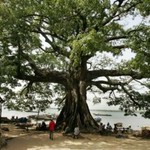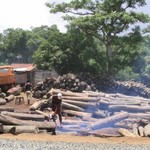
May 26, 2016 - Senegal's heavily forested southern region of Casamance will have no tree cover left by 2018 if illegal logging driven by Chinese demand is not addressed, a Senegalese ecologist warned Thursday.
Gambian loggers have long benefited from lax oversight of the area's forests to take prized rosewood timber over the border into the Gambia before exporting the logs to China.
Ecologist Haidar El Ali, a former environment minister, said the loggers' activities had "reached a point of no return," speaking at a press conference in Dakar on behalf of the environmental group he heads, Oceanium.
A reporting trip to the region by Oceanium captured images of a secret border market showing the collusion of Senegalese and Gambian loggers and Chinese middlemen, he said.
"Senegal has lost more than a million trees since 2010 while farmers in Gambia have pocketed 140 billion CFA ($238 million, 213 million euros) exporting the wood to China where the desire for furniture has exploded in the last few years," he added.
Chinese customs data shows the Gambia was the second largest exporter of rosewood in 2015. Nigeria, which ranked top, exported almost four times as much.
El Ali said trafficking had become so lucrative that he had observed "Senegalese migrants coming back from Europe to chop down this wood because it is so valuable."

The ecologist accused the Senegalese government of failing to do enough to tackle the problem and enforce the law, which states that exporting timber is illegal in Senegal.
The knock-on effects of desertification and less rainfall would be "irreversible", El Ali said.
According to environmental campaign group Forest Watch, Casamance has 30,000 hectares (74,000 acres) of forest remaining with 10,000 hectares already felled.



